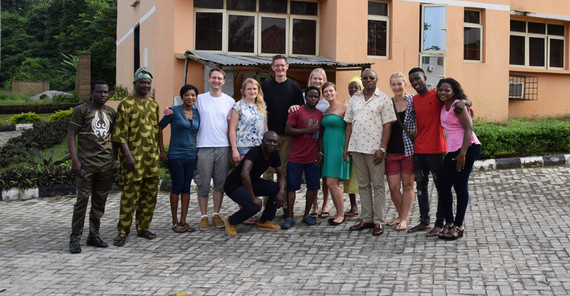October, 20th – Ibadan
Today is the last day of our Nigeria adventure. We eat a last breakfast at the alumni restaurant, before we say goodbye to the lovely people we got to know over the last two weeks. We take many pictures and finally board the bus that will take us back to Lagos. Due to the unpredictability of traffic, we have a lot of time until our 11 pm flight. We spend this time in the hotel close to the Lagos airport, where we stayed our first two nights. In a way, this symbolizes back to the beginning for us. We write our blog, sort pictures and start to reflecting about our time in this fascinating and diverse country. The things that go through our head right now cannot be put into words as we will need time to fully process all of the impressions we have made on this field trip. However, we are truly grateful for this incredible experience of learning linguistics and having a cultural exchange outside of the normal classroom context. Therefore, we would like to thank Prof. Dr. Wolf and Prof. Igboanusi who have made this field trip possible!
Because today’s entry is rather short, we thought our readers might be interested to read something about the research of PhD student Anna-Magdalena Finzel. She travelled with us to Nigeria to conduct interviews for her dissertation. The following text was written by her:The field trip to Nigeria (and especially the associated full care at the University of Ìbàdàn) was a unique chance for me to collect data for my dissertation in situ. In this dissertation, I compare three varieties of English – among others, Nigerian English – with respect to the impact of local concepts on the understanding of gender roles. My investigation includes conducting interviews in order to be able to draw conclusions on these roles.
So much for the theory. In practice, collecting data abroad is always a challenge, because you never know which kind of conditions (both including cultural and infrastructural conditions) to expect. Since some of my interview questions featured sensitive topics such as homosexuality, I had to be particularly careful to make the interview situation, which was exciting anyway, as convenient as possible for the participants. However, my initial concerns were quickly resolved by the more than open nature of the students. Moreover, the responses of the participants were not only well thought through, but also presented with excellent rhetorical skills. Their answers gave evidence of the distinct oral culture that prevails in Nigeria, as it is a country in which myths and traditions have long been passed on through word-of-mouth.
Another challenge that one has to face abroad is the “recruiting” of the informants. One needs to find out how to make the appointments binding in the best possible way, in order not to wait in vain. A student who addressed several people and who then accompanied them personally to the phonetics lab, where I was conducting the interviews, initially aided me. Since people here are incredibly supportive and accommodating, there were soon two more students who ensured that the confluence of interview partners did not stop. Hence, it sometimes happened that the colleagues of the lab were surprised at the gathering of students who were waiting patiently for their turn. At times, there were even interested people that had heard of the ominous German who was sitting in the cellar of the department, asking curious questions.
The assumption of a Nigerian Yorùbá activist, who predicted that I would not have any difficulties with posing the partly juicy questions, but that I should be prepared to receive several marriage proposals, could eventually not be confirmed. The students took the questions very seriously. Apart from the conversations themselves, I was particularly happy about the positive feedback from the participants, who obviously enjoyed the interviews a lot. Personally, I think the survey could not have gone any better. In addition, I am excited to evaluate the data now and to see results they will bring.
Text: Sandra Hesse, Anna Korneva und Valerie Pobloth
Published Online by: Alina Grünky
Contact to the online editorial office: onlineredaktionuuni-potsdampde

